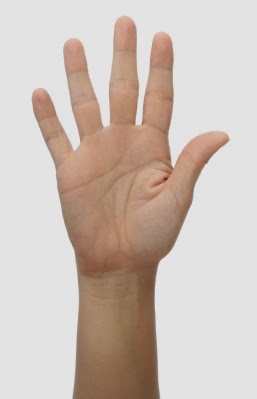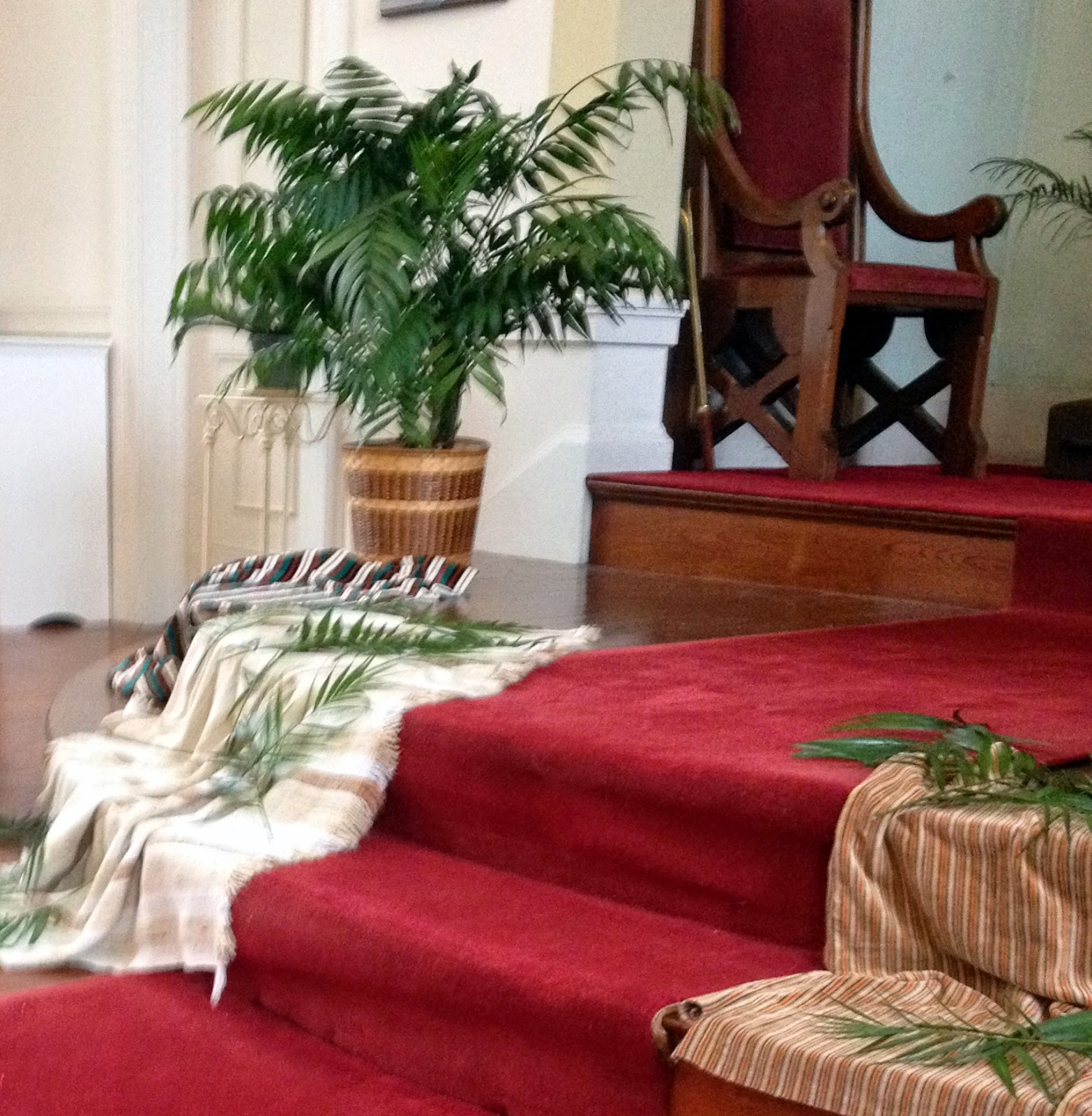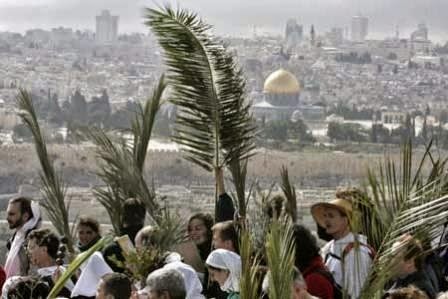“Don't Believe; Be LOVE”
Rev. Alison Longstaff, April
27, 2014
Bath Church of the New Jerusalem
Psalm 16; John 20:19-31; Heavenly
Secrets 1799:4
Today we heard the story of Thomas—of the famous “doubting Thomas” who needed to see and feel and touch the risen Lord, in order to believe in His resurrection. Doubting Thomas, the one who needed proof, the one who prompted God to say, “Blessed are those who have not seen and yet have come to believe.”
Believe. Belief. What is belief? In our culture, we have come to define belief as “confidence in something’s accuracy.” It is a purely mental exercise which involves approval of something as true. “Belief” in Christian circles has taken on such an identification with the rightness of ideas that it has become pretty well divorced from our heart reality and how we live. Indeed, we Christians seem to be reduced quite easily to squabbles over minute differences in our theologies when we could be working in harmony to live and love better, to reduce the suffering on our planet. We seem to prefer to spend our time getting huffy and drawing up battle lines over our different theological interpretations. We kick the beggars into the ditch in order to make more room for us to fight. What ever happened to us beating our swords into plowshares?
Belief. The original meaning of “belief” was not so much about ideas or statements of truth as it was about love. The origins of the word “belief” can be traced back to Proto-Germanic, and it was based on a root word for love. The German word “liebe,” which means “love” comes from the same source. Indeed, “believe” could be translated into “be-love” which is much closer to what it really meant. It was about living what we loved. It was about committing to a way of life. The original Christians “believers” committed themselves to a life of love and service to their neighbours, not to a framework of theological theories.
They committed to caring for the widows, the orphans, and the homeless because they loved the vision of a world transformed by such a life. They saw themselves in the homeless and widows, and they treated them as they would want to be treated. The way they lived was a commitment to the Golden Rule in every corner of their lives. How the meaning of the word “belief” has changed through the ages!
There is an old story from first century Palestine of a mischievous man who asked Rabbi Hillel, a famous rabbi of that time, to teach him Judaism while standing on one foot. So, while standing on one foot, Rabbi Hillel responded: "Don't do to others what you wouldn't have them do to you. That is all the Torah (God’s Word); all the rest is commentary.”
What a great story. I believe it speaks to all faiths of all time. Christianity can be simplified to the same basic tenet. It is about treating others as we would like to be treated.
What we are talking about is compassion. Compassion, which could be another translation for the “good will to all people” that is prophesied by the host of angels to the shepherds. Wouldn’t this indeed bring peace on earth, “good will to all people”?
The Dalai Lama has stated: “If you want others to be happy, practice compassion. If you want to be happy, practice compassion.” More than one scholar has observed that the fundamental uniting element of all the major world religions is the Golden Rule–to do unto others as we would have them do unto us. How would the world be different if only we all lived according to it!
Our rules and creeds and theological theories tend to divide us. Our hearts and love and human compassion tend to unite us. It is this realization that brings a whole new meaning to the Lord’s words to Thomas, “Blessed are those who have not seen and yet have come to believe.” It speaks to our tendency to be exclusive in our Christianity. It could be read as, “Blessed are those who have not met and come to love Jesus Christ as their Saviour and still have come to live a life of goodness and compassion.” Indeed, wouldn’t such people, be they Buddhist or Jewish or agnostic, by virtue of living the golden rule, find their lives and relationships transformed in blessed ways regardless of what religious organisation has their signature of membership? I would imagine their lives are certainly more peaceful than that of any Christian “believers” who are busy squabbling and fighting over points of dogma. Who would you say is more blessed?
And so it is with you and I, be we Swedenborgian or Seventh
Day Adventist, Unitarian or UCC, Catholic or Christian Reformed; we will find we are blessed by living the Golden Rule, regardless of our denominational affiliation. People of faith the world over do not necessarily believe every word of their traditional creeds, but they belong because they long for a blessed life. They long for belonging, and for their lives to have meaning and purpose. We belong, because we need community and we long for meaning. Don’t we all, especially when we are feeling that our own efforts are getting us nowhere, long to believe that there is some transformative power for good in the universe that can set things right, because our efforts repeatedly fall short?
Author and speaker Karen Armstrong has found that when we commit to a spiritual way of living, we are transformed by that commitment and by the living of it. It is in the practice of living a way of love that brings transformation, that lets us glimpse God. It is through ministry to others that we can feel the sense of what is sacred. Just as we experience in the Holy Communion, a very mundane act can become transcendent, and we can feel God’s presence.
So, to believe is to be love. “Believing” is not when I say with my lips how I understand God, but when I show with my hands and my feet
how I understand God’s love in the world.
When we commit to living the Golden Rule, the process of doing so brings
God’s grace into our lives. Though our
culture says “belief” means “trust in certain ideas,” we have seen that
believing is not and cannot be separated from how we live and how we love. When we commit to living a compassionate or
“Golden Rule” way of life, it changes us.
Now, back to doubting Thomas. Doubting Thomas needed to see and feel God’s wounds in order to believe. I have tended to judge him for that. When I have heard this passage, I have liked to think I would be one of the blessed who believes without seeing, not the obnoxious one who needs proof. But the thing is, lately I realize how much I do identify with Thomas. Sometimes I want physical proof that my God has not died and is still with me. I would guess, whether we like to admit it or not, that we all go through this at some time or other in our lives. But perhaps this is why Thomas is part of the story. Perhaps he is exactly part of the story to reassure us and remind us that we are still lovable despite our doubts, because we all tend to have times of terrible doubt. Maybe it is okay to need a little personal attention from our God to get us through. Jesus doesn’t begrudge us anything if it will bring us closer to Him. He comes right to us where we are to show us his hands and feet and side if that is what we need. I have needed to learn not to judge myself for struggling to believe.
Belief is such a struggle sometimes exactly because it is an action of the heart, not just the head. It is related to the word dis-couragement, which comes from the French word “coeur” for heart. When we are dis-heartened, God comes and en-courages us. He
fills our hearts up again. Whatever it takes.
So, if you find yourself struggling with doubt, don’t judge
yourself. Know that you are loved every
step of the way. Doubt is part of the
story too. In fact, doubt often serves
to deepen our faith and compassion, which is exactly what we are on earth to
do. We are here to Be Love. That is the way to be blessed and be a
blessing.
“believe”.
Dictionary.com. Online Etymology Dictionary. Douglas Harper, Historian. http://dictionary.reference.com/browse/believe (accessed:
March 26, 2008).
Originally preached March 30, 2008, St James Lutheran,
New Dundee, Ontario
Readings:
Psalm 16 Keep me safe, O God, for in you I take refuge. I said to the LORD, "You
are my Lord; apart from you I have no good thing." As for the saints who are in the land, they are the glorious ones in
whom is all my delight. The sorrows of those will increase who run
after other gods. I will not pour out their libations of blood or take
up their names on my lips. LORD, you have assigned me my
portion and my cup; you have made my lot secure. The boundary lines have fallen for me in pleasant
places; surely I have a delightful inheritance. I will praise the LORD, who
counsels me; even at night my heart instructs me. I have set the LORD always
before me. Because he is at my right hand, I will not be shaken. Therefore my heart is glad and my tongue rejoices; my body
also will rest secure, because you will not abandon me
to the grave, nor will you let your Holy One see decay. You have made known to me the path of life; you will fill me with joy in
your presence, with eternal pleasures at your right hand.
John 20:19-31 On the evening of that first day
of the week, when the disciples were together, with the doors locked for fear
of the Jews, Jesus came and stood among them and said, "Peace be with you!" After he said this, he showed
them his hands and side. The disciples were overjoyed when they saw the Lord. Again Jesus said, "Peace be with you! As the Father has sent me, I am sending you." And with that he breathed on
them and said, "Receive the Holy Spirit. If you forgive anyone his
sins, they are forgiven; if you do not forgive them, they are not
forgiven."
Now Thomas (called “the twin”), one of the
Twelve, was not with the disciples when Jesus came. So the other disciples told him,
"We have seen the Lord!" But he said to them, "Unless I see the
nail marks in his hands and put my finger where the nails were, and put my hand
into his side, I will not believe it." A week later his disciples were
in the house again, and Thomas was with them. Though the doors were locked,
Jesus came and stood among them and said, "Peace be with you!" Then he said to Thomas, "Put your finger here;
see my hands. Reach out your hand and put it into my side. Stop doubting and
believe." Thomas said to him, "My Lord and my God!" Then Jesus told him, "Because you have seen
me, you have believed; blessed are those who have
not seen and yet have believed." Jesus did many other miraculous
signs in the presence of his disciples, which are not
recorded in this book. But these are written that you
may believe that Jesus is the Christ, the
Son of God, and that by believing you may have life in his name.
Heavenly Secrets 1799:4
In the
Christian world it is our doctrines that cause our churches to be distinct and
separate, and because of these we call ourselves “Roman Catholics”,
“Lutherans”, “Calvinists” or “Reformed”, “Evangelical”, as well as many other
names. It is only because of our
doctrines that we are called by these names.
This situation
would never exist if we made love for the Lord and charity towards the neighbor
the most important part of faith. If
that were so, our doctrinal differences would be no more than shades of opinion
over the many arcana of faith, which truly Christian people would leave to
individual conscience.
In our hearts
we would then say that a person is truly a Christian if he or she lives as a Christian, that is, as Christ
teaches. If this were so, all the
different churches would become one, and all the disagreements, which stem only
from doctrine, would disappear. Indeed,
the hatred that one person holds against another would be dispelled in an
instant, and the Lord’s kingdom on earth would come.





































